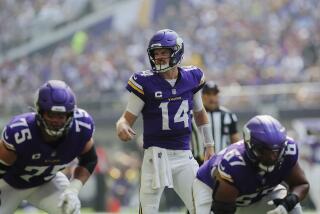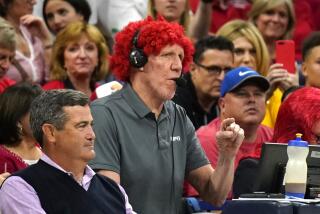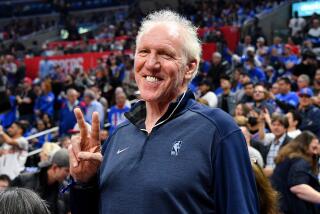WALSH : 49er Coach Is a Wall of Knowledge; Few See His Other Side
MIAMI — Bill Walsh, you’ve just won your third Super Bowl in the 1980s, sealing your fate as destiny’s child and one of the greatest coaches ever.
You’ve won 102 games in 10 years with the San Francisco 49ers, all the while speaking eloquently about fine wines and wide receivers.
You dress smartly, have a mean topspin forehand and can recite the Dred Scott decision in three languages.
Bill Walsh, you’ve done it all, and so much better than the rest. So what are you going to do now?
Honestly, I’ll probably take all this frustration out on the media.
Those who have watched and writhed with Walsh over the years can see it coming--an opportunity fatter than a roundhouse punch--should his 49ers slip past the Cincinnati Bengals in Super Bowl XXIII Sunday.
One more victory may trigger a final sunset ride out of town for Walsh on his high horse, since good will have triumphed over evil in the harsh football world Walsh has lived and/or imagined.
Walsh, they say, is as gracious a loser as you’ll ever know. And an equally horrible winner, like the field general once described by Winston Churchill as being “in defeat unbeatable, in victory unbearable.”
Never has that been more the case than in the 1988 season, in which Walsh has used personal setbacks and team controversies to rekindle a Super Bowl fire, with Walsh perhaps serving as team arsonist.
Leading the charge, Walsh has jumped his team over a season’s barriers, whether real and imagined. It began with his demotion as club president in March and continued through a quarterback controversy that he insists was invented by reporters.
It provided enough fuel to get his team over the rough spots, none knottier than a Nov. 13 loss to the Raiders that dropped the 49ers to 6-5 for the season.
“He probably had never sunk so low as after the loss to the Raiders,” said Mike White, a former coach at California and Illinois who is probably Walsh’s closest friend.
Since hitting the comeback trail, though, Walsh has been relentless, lashing out after every obstacle is cleared on the way to Super Bowl XXIII. His recent news conferences have become personal and well-crafted attacks against local reporters, blaming them for turning the Steve Young-Joe Montana controversy into the straw that nearly broke a team’s comeback. You wonder how a team ever made it this far.
Walsh had clearly defined the opponents.
“You might get that kind of feeling, that it’s always Bill against the world,” said Jim Finks, general manager of the New Orleans Saints. “He does have that image.”
Yet, it was a quarterback controversy, local reporters insist, that was created and fanned by Walsh himself, in a calculated effort to push an aging Montana to new heights.
When it backfired, and Montana was finally reinstated as the starter after reluctantly sitting out 2 games, Walsh needed an alibi. So he wrapped Montana neatly in a cloak of illness and injury, insisting that he had been benched for health reasons. Montana denies to this day that he was ever injured or fatigued.
Walsh, though, has stayed with that story. Before a season-ending game with the Rams, after the 49er recovery was complete, Walsh lamented about the travails of Montana and how injury had been misconstrued as controversy.
“To be honest with you, a lot of people doing the criticism knew full well what the problems were,” Walsh said. “They knew Joe had had major back surgery (in 1986), that he’d lost 10 pounds and was weakened. Even in his appearance, it was very obvious.
“Still, certain people in our press made a big issue of the fact that Joe wasn’t playing and did everything to convince people that I was confused as to what I was doing as a coach.
“The quarterback controversy, I feel, was ill-conceived and unfair to a lot of people, but we’ve gotten through it and we’re on our way.”
And so they were, though sometimes it seemed like Walsh against the world. In his news conference before the NFC title game against the Bears, Walsh valiantly defended his record, as if anyone had questioned it.
“We’re not going to be easy,” said Walsh, who then listed his impressive accomplishments. “There’s a lot positives about this football team. I’m not sure you want to hear it . . . 2 Super Bowls, 6 divisions . . . not bad.”
So the question is: Just who is Bill Walsh and what does he want? At 57, he seems ready to tie a ribbon on a brilliant coaching career. Most think he’ll call it quits if his team wins Sunday.
But for a man who has so precious little to prove, Walsh seems bent on proving it over and over, to whomever will listen. He has long been a mysterious nut to crack, followers say, mainly because he won’t let you get close enough with a cracker. He has a few close friends but generally stays a healthy distance from players and coaches.
Earlier this season, when Montana was struggling and mystified over his demotion, a reporter suggested that the quarterback meet with Walsh to clear the air. Montana said it wouldn’t make any difference, not even after a 10-year player-coach relationship.
White said it’s not uncommon for Walsh to go months at a time without speaking to one of his coaches. It happened to White 10 years ago, as a 49er assistant coach.
“For some reason, Bill has developed that style,” White said. “And it’s a natural barrier. You know, great leaders are respected but not always invited to dinner.”
Keeping your distance also makes it easier to administer, especially for one so hands-on as Walsh, who has full command of football operation.
As a player, backup quarterback Steve Young has grown to admire Walsh’s football genius, while walking gingerly in his coach’s footsteps.
“He doesn’t talk a lot to quarterbacks,” Young said. “I think he expects perfection, and you know that, and he drives you to play well enough just to get a nod. It’s like, you think you’re playing pretty well, and it’s like, ah, I think he nodded at me. I think I almost saw some reaction. I take that as positive.”
But if it takes fear to be motivated, Young says he doesn’t mind.
“He somehow gets you on edge,” he said. “You feel you’re always on edge. I get the feeling he’s staring at me every play, you know, and I’m saying, ‘OK, I’ll do better. I promise.’ I think he’s driven me by whatever he’s done. Or maybe I’ve just imagined it, but I keep working hard. Trying to impress him, I think, is the ultimate goal.”
So Walsh isn’t a player’s coach so much as a coach who makes great players.
Yet for all his successes, some insist that Walsh will ultimately leave the game unfulfilled, unhappy and under-appreciated.
Some contend that Walsh can hold a grudge with the best of them and may be doing so now. Does he still resent not landing an NFL head-coaching job until he was 47? He seems a paradox, a man who wraps himself in his scholarly image--the connoisseur of fine wine and history--yet is much more a football workaholic than he lets on.
Walsh wrote his master’s thesis on defensive football.
“He’s a lot more like Mike Ditka than Arthur Schlesinger,” said Ira Miller, a Bay Area sportswriter who has covered Walsh for nearly 10 years.
So what does Bill Walsh want? More respect than he has? More titles? Why the 100-pound chip on the shoulder?
During an interview session last week in Santa Clara, Calif., Walsh was asked if he had fulfilled every goal in his coaching career.
“Oh sure,” Walsh said. “Of course, some of you (reporters) haven’t agreed every week. But my offense is updated. I know it’s been outdated, as you’ve indicated every other week. . . . I’m kidding. It’s been very good, I’m pleased, gratified.”
Are you sure?
It doesn’t take a read-between-the-lines reader to detect something missing on Walsh’s gratitude meter.
“He’s a sensitive guy,” White said. “And I know there hasn’t been the appreciation for what he’s done. I’ve never heard him verbalize it, that it’s the press’ fault. But he’s never felt the Bay Area press or the people have been as supportive. He’s never said it to me, but he’s said it in other ways.”
During his visit to Chicago for the NFC title game, Walsh remarked to friends how much excitement there seemed to be about the Bears in Chicago, as if that feeling were somehow foreign to San Franciscans.
Also, Walsh reportedly was hurt that more attention wasn’t given his 100th pro victory (including playoffs), recorded 3 weeks ago in the first-round playoff win over Minnesota.
Walsh seems to absorb the hurt before channeling it into high football energy. Always another hurdle to climb.
Nothing wounded Walsh more than his demotion last off-season as club president. The edict was handed down by owner Eddie DeBartolo Jr.--who assumed the duties of president--after the 49ers, who had won Super Bowl XIX in 1984, were bounced out in the first round for the third consecutive season. DeBartolo and Walsh didn’t speak for 6 weeks after the 49ers’ 36-24 playoff loss to the Vikings.
The demotion stripped Walsh of his title, yes, but not his actual powers. The stripping of Walsh’s dignity was another matter.
“I don’t think any of us realize how that Minnesota game affected him and the organization,” White said. “We know how it affected Eddie. I don’t know if it was the taking away of the president title that has made (Walsh) even more motivated than ever to prove once and for all how solid that organization was. When it was sliding, when he was really down, that’s when he really took charge.”
Walsh was stung again on March 22, 1988, when a local gossip columnist hinted at an alleged affair between Walsh and a local model.
“What genius coach is being put on waivers by his wife for his long-running relationship with a TV sports reporter who’s a former Playboy centerfold?” the item teased.
Walsh had been separated from his wife, Geri.
Though the story was never explored further or substantiated, some believe that Walsh has been taking it out on reporters ever since.
“It hurt him a lot,” White said of the report.
Walsh believes he deserves better, considering the riches he has brought to the Bay Area since his arrival in 1979. There have been no mysteries about Walsh on the field; no questions or quandaries. Walsh took over a team that won 2 games in 1978 and had only 2 losing seasons--2-14 and 6-10--before bringing a Super Bowl championship to San Francisco after the 1981 season.
His team is the winningest in the 1980s, with only 2 losing seasons in the decade--6-10 in 1980 and 3-6 in 1982.
More remarkable to observers has been the high level of consistency, even through the non-Super Bowl years. Walsh enters Sunday’s game with only five players who participated in his first Super Bowl win. Thirty players on this year’s team weren’t around in the 1984 season, when the 49ers defeated Miami in Super Bowl XIX.
Yet, since the last Super Bowl trip, Walsh’s teams have posted records of 10-6, 10-5-1, and 13-2.
“That’s very hard to do,” said Finks, who has built strong franchises in Minnesota, Chicago and now New Orleans. “It’s the way the (draft) system is. You’re penalized by success. He’s done an excellent job at refueling the club. He’s done as good a job as anyone’s ever done in the business.”
And the 49ers are all Bill Walsh. He orchestrates his team’s yearly player drafts, makes all personnel decisions and coaches a little on the side.
In 1985, Walsh traded draft choices to New England for the right to move up and take wide receiver Jerry Rice. Not a bad pick.
In 1986, Walsh took defensive end Larry Roberts in the second round, fullback Tom Rathman and cornerback Tim McKyer in the third, linebacker Charles Haley, offensive linemen Steve Wallace and Kevin Fagan in the fourth and corner Don Griffin in the sixth round.
You’ll hear more from those players Sunday. In 1987, he drafted starting tackle Harris Barton. This year, second-round defensive picks, ends Pierce Holt and Danny Stubbs, have been big contributors, as has a third-round linebacker, Bill Romanowski.
Walsh has succeeded, he says, because his owner has kept his nose out of Walsh’s business--with the exception of one aforementioned, nameplate-removing outburst.
“The bottom line of it all is that Ed DeBartolo has given me the responsibility of doing it,” Walsh said. “A lot of organizations will stop and start pointing fingers at each other. They blame each other, and before long, no one will make a decision. No one will step forward.”
Bill Walsh has stepped forward. Now he wants to be counted, though he is widely recognized as a coach with few peers.
“I sharpened my skills being around him, almost just by accident,” White said.
Walsh’s expertise is in quickly dissecting an opponent and constructing a visionary game plan to exploit weaknesses. You have no doubt heard that the first 25 plays of a Walsh game plan are scripted in advance.
There are complicated explanations of Walsh’s gift, and one other offered by quarterback Young.
“No one’s going to pull anything over on Bill Walsh,” he said. “There’s no way.”
Walsh studied in some fine finishing schools, but no time was more important than 8 years spent under Paul Brown with the Cincinnati Bengals.
“I don’t think anyone is more creative,” White said of Walsh. “As far as executing a game plan on game day, there’s no one I respect more. . . . I think he’s very intelligent. I don’t know what his IQ is, but all you can do is learn by being around him, almost by osmosis. I marvel how he uses Rice and (Roger) Craig, the way he utilizes what he’s got.”
White says Bill Walsh is really quite a guy, if you’d only take the time to get to know him. Of course, some might add, who has that much time?
More to Read
Go beyond the scoreboard
Get the latest on L.A.'s teams in the daily Sports Report newsletter.
You may occasionally receive promotional content from the Los Angeles Times.










